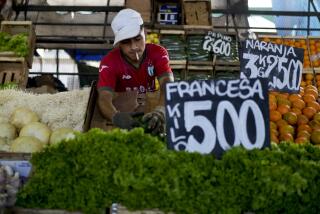Yugoslav Prices Hiked, Currency Devalued 23%
- Share via
BELGRADE, Yugoslavia — The government on Saturday lifted price and import controls and announced major price boosts and a 23.9% devaluation of the Yugoslav currency as part of a long-awaited economic austerity program aimed at reducing rampant inflation and a huge foreign debt.
The new austerity package also calls for a reduction in wages of up to 30% at a time when 80% of manufacturers have announced higher prices for their products. The prices have been frozen since November.
Gasoline prices Saturday increased an average of 36.1%, electricity 31.4%, postal services 28.1%, rail transport 38.5% and coal 30.3%, a government announcement said.
Thousands of workers have protested the measures since they were first unveiled earlier this month, staging a wave of strikes across the country.
Living Standard May Worsen
The price boosts, along with the other austerity measures, are expected to worsen Yugoslavia’s living standards, which have already declined by one-third since 1980.
The government, however, has prepared an emergency social welfare program to assist those with the lowest incomes, according to the state-run Tanjug news service. The prices of such staples as cooking oil, flour and milk remained frozen, but producers will be compensated by the state, the government said.
The timing by Yugoslav Premier Branko Mikulic was seen as bold because it comes one day before the start of a special three-day Communist Party conference called to tackle the nation’s economic crisis and hammer out unity on reform plans.
The government Saturday also scrapped foreign exchange controls and lifted price controls on about 60% of commodities and 40% of imports at a time when Yugoslavia’s inflation is hovering at about 170%, the highest in Europe.
Clears Way for New Loans
These reforms, worked out in accordance with demands by the International Monetary Fund, were apparently an attempt to speed up the signing of an agreement that would allow the East Bloc nation to reschedule its $21-billion foreign debt. The moves also clear the way for new loans to revitalize Yugoslavia’s ailing economy.
The country needs about $400 million in additional funds from Western commercial banks to import the raw materials and various products needed to keep its home market supplied and increase imports to earn Western currency. It will need an additional $600-million loan before the end of 1988 to sustain the new measures, according to the Tanjug agency.
Saturday’s currency devaluation, which will make Yugoslav exports cheaper and encourage foreign tourists, was the second big reduction in the dinar’s value in seven months, although it has been depreciating rapidly day by day for several years.
However, the devaluation may at the same time make many imports too expensive for Yugoslavs to buy.
New Exchange Rate
Under a new exchange rate, $1 buys 1,925 dinars and financial experts said the local currency will continue sliding in its value toward the dollar, depending on a daily situation in the Yugoslav bank’s foreign exchange market.
On Nov. 17, the government devalued the dinar by 24.6%, increased prices of essential goods and services and then imposed a six-month price freeze and salary control. But even under that regime of “frozen prices” the inflation rate in the past six months has been 6% to 8% per month. In that same period, the value of the dinar has dropped by an average 90%.
The new economic package was originally scheduled to start May 15 but was put off because of the lack of new loans from Western creditors.
With the new package in force, economic experts assume a monthly inflation rate in June and July to reach at least 12% before it eventually begins dropping once a market situation is settled under supply and demand rules.
More to Read
Sign up for Essential California
The most important California stories and recommendations in your inbox every morning.
You may occasionally receive promotional content from the Los Angeles Times.













